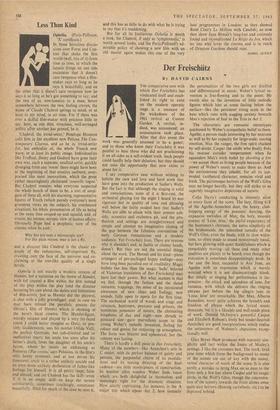Less Than Kind .
`Chabrol, the trend-setter,' Penelope Houston calls him in her excellent new Pelican The Con- temporary Cinema, and so he is; trend-setter for, but embodier of, the whole French new wave, or at least its public image. Individualists like Truffaut, Demy and Godard have gone their own way, each a separate, unallied artist, quickly diverging from any 'norm' there might have been at the beginning of that creative outburst, over- praised like most innovations, which the press rather meaninglessly christened `nouvelle vague.' But Chabrol remains what everyone suspected the whole bunch of them to be, a sort of amal- gam of them all, with his alarming, representative figures of Youth (which parody everyone's most gruesome views on the subject), his overheated situations, his whole presentation of life as being at the same time souped-up and squalid, and, of course, his intense, myopic view of human affairs. Obviously Pope had a prophetic view of the cinema when he said:
Why has not man a microscopic eye? For this plain reason, man is not a fly,
and a director like Chabrol is the classic ex- ample of the industrious, self-important fly, crawling over the face of the universe and ex- claiming at the tree-like quality of a single bristle.
Ophelia is not exactly a modern version of Hamlet, but a variation on the theme of Hamlet, with (of course) a film within the film instead of the play within the play (and the director lecturing his cast about the duties and limitations of film-actors, just as Hamlet did the players), a chat with a jolly gravedigger, and, in case we may have missed the parallels, posters for Olivier's film of Hamlet which is showing at the hero's local cinema. The Hamlet-figure, weirdly miscast and played by a very fat-faced youth I could better imagine as Osric, or pos- sibly Guildenstern, sees his mother (Alida Valli, the perfect Gertrude, but sub-directed and so ineffective) marry his uncle too soon after his father's death, loves the daughter of his uncle's factor, whom he insists on addressing as Polonius (`Pas connu,' says Polonius, in the film's only funny moment), and at last drives his (innocent) uncle to a rather unlikely suicide and an even more unlikely declaration of father-like feelings for himself. It is all pretty inept, false and absurd, and yet Chabrol has the skill—even if it is an empty skill—to keep the screen satisfactorily, sometimes touchingly, sometimes beautifully, filled for much of the time he uses it,
and this has so little to do with what he is trying to say that it's maddening.
But for all its limitations Ophelia is worth a look, for Chabrol, if only as 'symptomatic,' is worth several looks, and'the Paris-Pullman's ad- mirable policy of showing 'a new filM with an old master again makes this one of the very best programmes in London; as they showed Rent Clair's Le Million with Candide, so now they 'show Jean Renoer's long-lost and curiously found and reconditioned La Regle du Jeu, which no one whri' loves the cinema and is in reach of Drayton Gardens should miss.
ISABEL QUIGLY


































 Previous page
Previous page